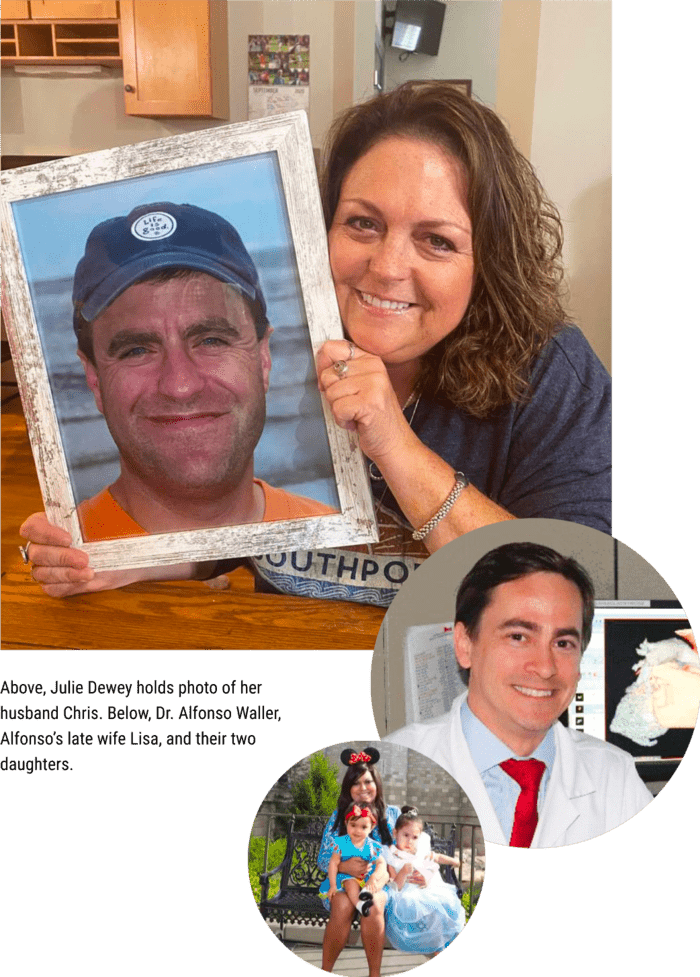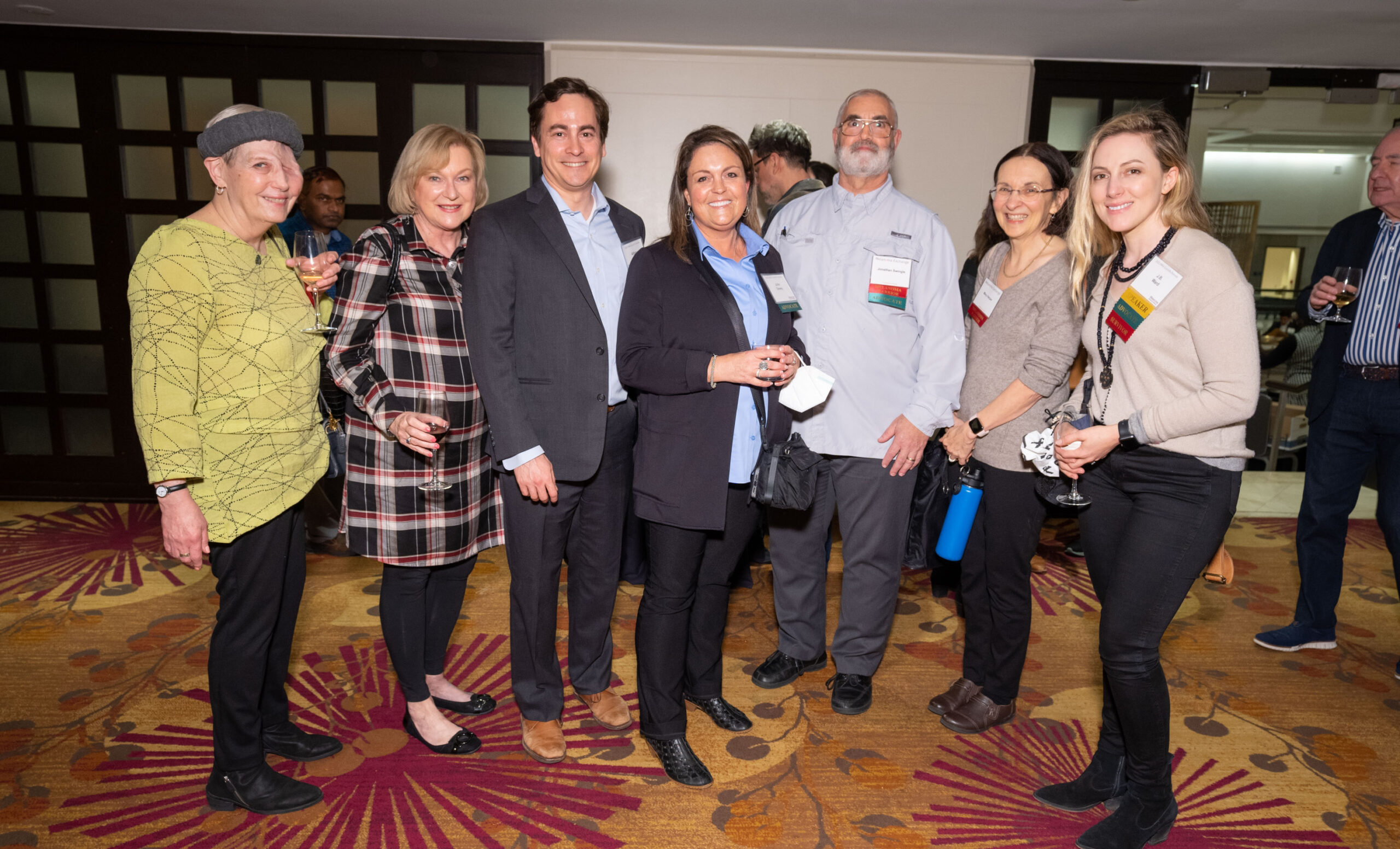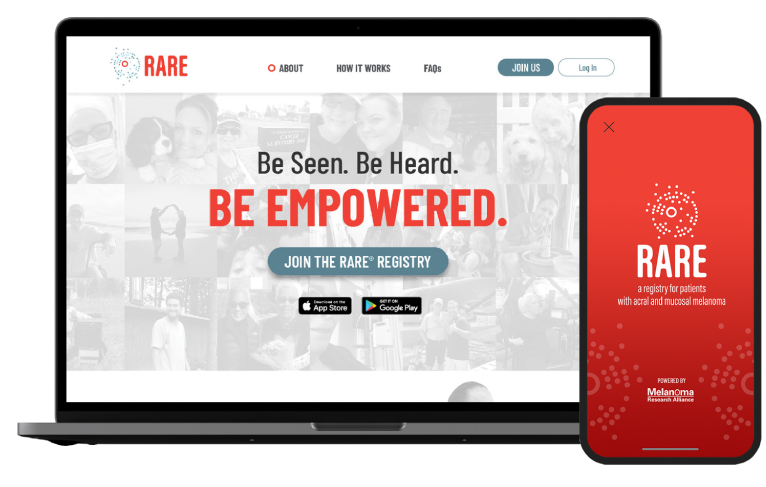![]()
RARE REGISTRY
Providing Hope Through Innovation
Each year approximately 5,000 patients are diagnosed with acral or mucosal melanoma.1 These rare melanoma subtypes arise in non-sun exposed areas and are not believed to be caused by UV damage. Due to the relative obscurity of these rare subtypes, patients face mounting challenges ranging from late diagnoses, lack of support, limited — and often dated — access to information, and overall poorer prognoses. Treatment options are also more limited and less effective for these rare melanoma subtypes than for the more common cutaneous melanoma that forms on sun-exposed skin.
To address this, MRA launched the RARE Registry — a first-of-its-kind, direct-to-patient registry focused on acral and mucosal melanoma — in 2022. The registry:
- Collects data directly from patients with acral or mucosal melanoma using a series of surveys available online.
- Returns real-time de-identified information collected from participants in the form of ‘Insights’, provides educational opportunities that highlight emerging science and ways to connect with researchers and other advocates, and notifications about pertinent clinical trials.
- Provides researchers and clinicians with an unprecedented look into the disease journey of patients with these rare melanoma subtypes, giving them the information they need to develop more effective treatment strategies.
- Includes an Oversight Committee comprised of patients, caregivers, and a multidisciplinary group of medical advisors to help further guide the registry over time.

As they explored this further, they discovered that many individuals in the Facebook group had experienced delays in getting a correct diagnosis. Moreover, even when properly diagnosed, there was no clear standard treatment protocol; and trends seemed impossible to identify across demographics, age, gender, and area of diagnosis — especially when any one medical center saw only a handful of patients with rare melanomas each year. “The more Alfonso and I talked, the more we wanted to find a way to bring patients together to accelerate research alongside the doctors and researchers. We wanted tumor DNA to be studied. And we wanted all of this in one place,” says Dewey.
Each year approximately 5,000 patients are diagnosed with acral or mucosal melanoma.1 These rare melanoma subtypes arise in non-sun exposed areas and are not believed to be caused by UV damage. Due to the relative obscurity of these rare subtypes, patients face mounting challenges ranging from late diagnoses, lack of support, limited — and often dated — access to information, and overall poorer prognoses. Treatment options are also more limited and less effective for these rare melanoma subtypes than for the more common cutaneous melanoma that forms on sun-exposed skin.
To address this, MRA launched the RARE Registry — a first-of-its-kind, direct-to-patient registry focused on acral and mucosal melanoma — in 2022. The registry:
- Collects data directly from patients with acral or mucosal melanoma using a series of surveys available online.
- Returns real-time de-identified information collected from participants in the form of ‘Insights’, provides educational opportunities that highlight emerging science and ways to connect with researchers and other advocates, and notifications about pertinent clinical trials.
- Provides researchers and clinicians with an unprecedented look into the disease journey of patients with these rare melanoma subtypes, giving them the information they need to develop more effective treatment strategies.
- Includes an Oversight Committee comprised of patients, caregivers, and a multidisciplinary group of medical advisors to help further guide the registry over time.
As they explored this further, they discovered that many individuals in the Facebook group had experienced delays in getting a correct diagnosis. Moreover, even when properly diagnosed, there was no clear standard treatment protocol; and trends seemed impossible to identify across demographics, age, gender, and area of diagnosis — especially when any one medical center saw only a handful of patients with rare melanomas each year. “The more Alfonso and I talked, the more we wanted to find a way to bring patients together to accelerate research alongside the doctors and researchers. We wanted tumor DNA to be studied. And we wanted all of this in one place,” says Dewey.

The RARE Registry is an example of MRA’s unique ability to listen and respond to community needs while also addressing research gaps.

The RARE Registry is an example of MRA’s unique ability to listen and respond to community needs while also addressing research gaps. “MRA answered the call on every level,” says patient advocate and registry advisor Julie Dewey. “They were the only group who could do it all. They could find the funding to support it; they had the team in place to create the surveys needed to collect the most pertinent information; and they were familiar with other cancer registries. They also had the ambition and the compassion to make it happen with the patient community. Finally, they understood the immediate need — lives were on the line.”
The idea for the registry began years earlier in a Facebook support group called the Mucosal Melanoma Warriors, where a few hundred patients and family advocates shared information about their healthcare journeys as well as providing one another with much-needed support. Through this group, Dewey met Dr. Alfonso Waller. The two bonded, sharing information about their spouses who were diagnosed with mucosal melanoma: Dewey’s husband Chris was diagnosed at age 48 and Waller’s wife Lisa was diagnosed at age 39, 6 weeks after their second daughter was born. Everywhere they looked, the information available about the disease was based on a small sample of patients and did not line up with the journeys they were on.
As they explored this further, they discovered that many individuals in the Facebook group had experienced delays in getting a correct diagnosis. Moreover, even when properly diagnosed, there was no clear standard treatment protocol; and trends seemed impossible to identify across demographics, age, gender, and area of diagnosis — especially when any one medical center saw only a handful of patients with rare melanomas each year. “The more Alfonso and I talked, the more we wanted to find a way to bring patients together to accelerate research alongside the doctors and researchers. We wanted tumor DNA to be studied. And we wanted all of this in one place,” says Dewey.
As they spoke to their extended network, the idea continued to blossom. Together, they dreamed of a community where patients and caregivers could help accelerate research by providing information and by helping set research priorities; a place where they could ask questions, seek support, and get updates on the latest advances; and a place where rare melanomas would always be front and center.
“We wanted answers for our community, and we wanted our community to be part of finding those answers.”
Julie Dewey, Patient Advocate
“We wanted answers for our community, and we wanted our community to be part of finding those answers,” says Dewey.
Thanks to a mutual friend, Waller was able to get in touch with MRA’s CEO Dr. Marc Hurlbert and he pitched just that. “I suggested we bring together a community of patients, caregivers, and advocates who’ve been impacted by rare melanomas to create a registry,” says Waller. “Marc was very excited, and he told me about his experience with a similar-type of registry he led in the breast cancer space.”
As the MRA team looked further into direct-to-patient registries, it became clear that patients with mucosal melanoma weren’t the only ones who could benefit from such a project. While patients with uveal melanoma — which affects the eye — had several registries open to them, those with acral melanoma had no such options.
The MRA team quickly set up conversations with advocates from the acral melanoma community. Call after call, similar frustrations about delays in diagnosis, lack of standard treatment plans, and feelings of isolation kept coming up.
“The challenges experienced by these two communities — while distinct on the surface — are quite similar,” says Dr. Hurlbert. “More important than similar challenges, it was clear that advocates from both communities were eager to work together to change this status quo. That’s when we knew that this project needed to move forward.”
The RARE Registry was not only an idea by advocates, caregivers, and patients — they have quite literally been at the helm of designing it at every juncture, from its name, branding, web and mobile capabilities, survey questions, and even the request for a longitudinal study and tumor data.
The registry is creating a different journey for the betterment of patients with acral and mucosal melanoma. What was a once terrifying diagnosis riddled with outdated statistics and fear is now met with accurate information, community, and hope. It is nothing short of empowering. For example, the RARE Registry is focused on better understanding the quality of life throughout the treatment journey, from diagnosis to survivorship — something often overlooked by researchers but critical to patients.
It also allows participants to see how they fit into the larger picture by comparing their responses to others who have also answered specific survey questions. It’s a lifeline during an otherwise scary and far too often isolating journey.
As she reflects on this registry journey, Dewey says, “Chris’ life was not in vain. When he was diagnosed, he already had Stage 4 disease. We knew this registry wouldn’t come in time to benefit him but, rather, for future patients diagnosed with mucosal melanoma. It feels remarkable to have created this registry. In that way, Chris was a pioneer. He had a purpose in his life, and I strongly believe the registry was it.”![]()

Patient advocates at MRA’s 2023 Scientific Retreat & Patient Forum (L to R): Eileen Walther, Patricia Janiak, Alfonso Waller, Julie Dewey, Jonathan Swingle, Mary Harper, and J.B. Ward
The RARE Registry is an example of MRA’s unique ability to listen and respond to community needs while also addressing research gaps.




1. Melanoma Research Alliance (MRA). RARE Registry. Available at: www.curemelanoma.org/research/rare-registry
